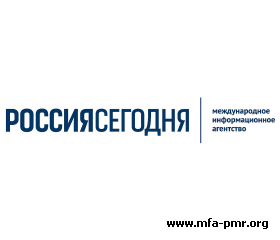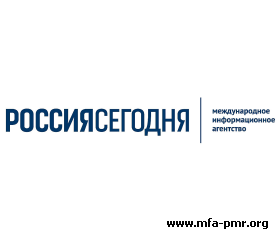Minister of Foreign Affairs of Pridnestrovie Nina Shtanski in an exclusive interview to international news agency Rossiya Segodnya (Russia Today) supported the position of the Russian Foreign Ministry on the format of the existing peacekeeping mission in the conflict zone.—Nina Viktorovna, today the Information and Press Department of the Ministry of Foreign Affairs of Russia made a comment on inadmissibility of transformation of the existing peacekeeping format on the Dniester. What is the position of Pridnestrovie on this matter?—Pridnestrovie consistently holds the view on inadmissibility to transform the format of the existing unique according to its effectiveness level peacekeeping operation on the Dniester River.Peacekeeping operation has already been carried out for more than 20 years and its main result is effective separation of the conflicting parties and preserving peace and stability on the Dniester. Stabilizing role of the existing peacekeeping mission under the leading functions of Russia is invaluable. Joint peacekeeping forces enjoy unconditional confidence of people.— There recently have been increasing statements that the time has come to give international civil character to the mission functioning on the Dniester, and also for any aspects reminding of the conflict to be neutralized?
—Statements of this kind are a good few indeed. Sometimes it seems that some Moldovan representatives fulfil some “quantitative norm” under somebody's order. The absence of armed clashes and relatively controlled situation in the security zone – this is a direct consequence of the fact that the successful and functional peacekeeping system has been established, several elements of which mutually complement each other. I do not think our partners in Moldova forgot that the civil observer mission was established once on the banks of the Dniester in 1992. At that time the participants of that four-side mission (from Moldova, Ukraine, and Romania), except Russian representatives, hurriedly left the Pridnestrovian city Bendery before the start of armed clashes, caring solely about their personal safety. They simply fled. Bloodshed as a result of the armed aggression launched by the Moldovan side could not be avoided. Hundreds of civilians died, including children. At that time Russia stopped the bloodshed, separated the conflicting parties, initiated the establishment of the peacekeeping mission and brought the parties to the negotiating table.Pridnestrovie remembers well the lessons of history today, as before, highly appreciates considered and responsible approach of the Russian Federation to the functioning of the peacekeeping mission on the Dniester.
—In this case, why do some Western States and organizations take a different view and why has criticism increased in recent months?— It is obvious that the aim of such statements and activities are the creation of unfavorable information background for the peacekeeping mission which completely does not promote the settlement of the conflict between Pridnestrovie and Moldova. We find difficulty in understanding of that irritation of some countries in relation to the presence of well-trained and well-equipped peacekeepers of the Russian Federation in this region of Europe. It is the presence that is key factor that impedes the unfreezing of the conflict.Such activities as Brussels round table at which enough biased study of two experts well-known for their prejudiced attitude to Pridnestrovie has been provided for the third time this year hardly have any practical value. Once, I have got the opportunity to be a participant of expert formats, and in this regard I can assure that practice of discussing reports in October which were widely presented and discussed in different countries in April and May (as it was in the discussed case) is, to say the least, quite peculiar. Essentially, through enough unprofessional imitation the same cause – the release of some very old report of Moldovan and Romanian experts - is promoted again and again through round tables in the capitals of state- members of “the Permanent Conference…”.Pridnestrovie hopes that experts will apply their knowledge and experiences in order to make concrete proposals and recommendations on problematic issues which are a part of the negotiation space, and will avoid making contributions to destructing one of the few effective platform for cooperation between the parties.The recent statements of Ambassador of Moldova in Ukraine Ion Stevile who considers that the peacekeeping mission performed in Pridnestrovie does not meet any “accepted international criteria”. I would not like to comment on passages of this kind, I just remind that 20 years ago Russia made an attempt to internationalize the peacekeeping process on the Dniester by requesting the OSCE and the UN, but was refused.Originally published by ria.ru
Minister of Foreign Affairs of Pridnestrovie Nina Shtanski in an exclusive interview to international news agency Rossiya Segodnya (Russia Today) supported the position of the Russian Foreign Ministry on the format of the existing peacekeeping mission in the conflict zone.
—Nina Viktorovna, today the Information and Press Department of the Ministry of Foreign Affairs of Russia made a comment on inadmissibility of transformation of the existing peacekeeping format on the Dniester. What is the position of Pridnestrovie on this matter?
—Pridnestrovie consistently holds the view on inadmissibility to transform the format of the existing unique according to its effectiveness level peacekeeping operation on the Dniester River.Peacekeeping operation has already been carried out for more than 20 years and its main result is effective separation of the conflicting parties and preserving peace and stability on the Dniester. Stabilizing role of the existing peacekeeping mission under the leading functions of Russia is invaluable. Joint peacekeeping forces enjoy unconditional confidence of people.
— There recently have been increasing statements that the time has come to give international civil character to the mission functioning on the Dniester, and also for any aspects reminding of the conflict to be neutralized?
—Statements of this kind are a good few indeed. Sometimes it seems that some Moldovan representatives fulfil some “quantitative norm” under somebody's order. The absence of armed clashes and relatively controlled situation in the security zone – this is a direct consequence of the fact that the successful and functional peacekeeping system has been established, several elements of which mutually complement each other.
I do not think our partners in Moldova forgot that the civil observer mission was established once on the banks of the Dniester in 1992. At that time the participants of that four-side mission (from Moldova, Ukraine, and Romania), except Russian representatives, hurriedly left the Pridnestrovian city Bendery before the start of armed clashes, caring solely about their personal safety. They simply fled. Bloodshed as a result of the armed aggression launched by the Moldovan side could not be avoided. Hundreds of civilians died, including children. At that time Russia stopped the bloodshed, separated the conflicting parties, initiated the establishment of the peacekeeping mission and brought the parties to the negotiating table.
Pridnestrovie remembers well the lessons of history today, as before, highly appreciates considered and responsible approach of the Russian Federation to the functioning of the peacekeeping mission on the Dniester.
—In this case, why do some Western States and organizations take a different view and why has criticism increased in recent months?
— It is obvious that the aim of such statements and activities are the creation of unfavorable information background for the peacekeeping mission which completely does not promote the settlement of the conflict between Pridnestrovie and Moldova. We find difficulty in understanding of that irritation of some countries in relation to the presence of well-trained and well-equipped peacekeepers of the Russian Federation in this region of Europe. It is the presence that is key factor that impedes the unfreezing of the conflict.
Such activities as Brussels round table at which enough biased study of two experts well-known for their prejudiced attitude to Pridnestrovie has been provided for the third time this year hardly have any practical value. Once, I have got the opportunity to be a participant of expert formats, and in this regard I can assure that practice of discussing reports in October which were widely presented and discussed in different countries in April and May (as it was in the discussed case) is, to say the least, quite peculiar. Essentially, through enough unprofessional imitation the same cause – the release of some very old report of Moldovan and Romanian experts - is promoted again and again through round tables in the capitals of state- members of “the Permanent Conference…”.
Pridnestrovie hopes that experts will apply their knowledge and experiences in order to make concrete proposals and recommendations on problematic issues which are a part of the negotiation space, and will avoid making contributions to destructing one of the few effective platform for cooperation between the parties.
The recent statements of Ambassador of Moldova in Ukraine Ion Stevile who considers that the peacekeeping mission performed in Pridnestrovie does not meet any “accepted international criteria”. I would not like to comment on passages of this kind, I just remind that 20 years ago Russia made an attempt to internationalize the peacekeeping process on the Dniester by requesting the OSCE and the UN, but was refused.Originally published by ria.ru










